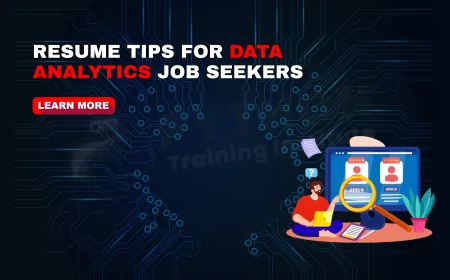Customized Online Python Training Options Pune | Online Python Courses Designed for Your Needs – Pune
Discover the best one-on-one Python tutoring services in Pune with personalized coaching, flexible scheduling, and expert guidance for beginners to advanced learners. Get tailored support to master Python programming effectively.

Table of Contents
- Introduction
- Why Choose Customized Python Training?
- Key Benefits of Online, Customized Learning
- Why Pune Students & Professionals Prefer Customized Online Courses
- Types of Customized Online Training Options
- Top Providers & Platforms for Pune Learners
- Curriculum Customization & Flexibility
- Mentorship and Support Structures
- Tools, Platforms & Technologies Used
- Pricing Models & Financing
- Tips for Maximizing Online Learning
- Success Stories from Pune Learners
- How to Evaluate Your Training Option
- Emerging Trends in Customized Python Training
- Corporate & Team Python Training
- Future Prospects & Career Progression
- Online vs Offline vs Hybrid
- Common Challenges & How to Overcome Them
- 20 Frequently Asked Questions
- Conclusion
1. Introduction
Pune has long been a hub for IT education, boasting tech parks and a thriving startup ecosystem. With the rise of remote learning, customized online Python courses have become the go-to choice for Pune-based learners—from college students to working professionals—seeking flexibility without compromising quality. This article takes an in-depth look at the customized online Python training options available to Pune learners, providing insights into curriculum, mentorship, pricing and success strategies.
2. Why Choose Customized Python Training?
Unlike rigid batch-based classes, customized online Python training adapts to your goals, pace, and background. Key reasons learners choose it include:
- Goal-oriented curriculum: You can focus on AI, web development, automation, or basics.
- Adaptive pacing: Skip topics you already know, dive deeper into advanced subjects.
- Flexible timing: Evening/weekend classes suited for working professionals or students.
- Personal attention: One-on-one mentoring keeps motivation and accountability high.
3. Key Benefits of Online, Customized Learning
Personalization delivers strong outcomes:
- Efficient learning: No time wasted on generic content.
- Better retention: Lessons tailored to integrate with your existing knowledge.
- Real-world focus: Project-based modules in your domain (e.g., finance automation, IoT, ML).
- Support anytime: Slack, Discord or WhatsApp groups enable doubt resolution beyond live sessions.
4. Why Pune Students & Professionals Prefer Customized Online Courses
Consider the local context:
- Tech Campus Culmination: Many Pune grads enter internships or campus placements targeting Python roles; customized modules allow them to prep for specific companies.
- Busy schedules: Working professionals at TCS, Infosys and startups balance time zones and release cycles; flexible sessions reduce schedule conflicts.
- English + Regional intent: Bilingual learners appreciate Hindi/Marathi-enabled mentoring options.
5. Types of Customized Online Training Options
- One-on-One Mentorship: Focused, flexible, and tailored to your project.
- Group Coaching (mini-groups 3–5 learners): Shared feedback, peer learning, lower cost than one-on-one.
- Self-Paced with Mentor Checkpoints: Pre-recorded modules with monthly review sessions.
- Hybrid Customized Programs: Mix of online core modules + optional face-to-face or lab visits.
6. Top Providers & Platforms for Pune Learners
Pune learners can choose from a variety of platforms:
- Webasha Technologies: Customized modules in Flask/Django, data automation, ML pipelines.
7. Curriculum Customization & Flexibility
Many providers allow you to choose modules based on:
- Core Python foundations
- Data Analysis (NumPy/Pandas)
- Web Development (Flask, Django)
- Automation & Scripting (Selenium, BeautifulSoup)
- Data Science & ML (Scikit‑learn, TensorFlow, PyTorch)
- DevOps & Deployment (Docker, AWS, GCP)
- Performance and Optimization (Profiling, Multiprocessing)
Modules are rearranged to target your goal: job ready, publishing API services, automating tasks, or diving into deep learning.
8. Mentorship and Support Structures
Common support structures include:
- Weekly mentor calls: Progress reviews and next-module planning.
- Saturday coding clinics: Address coding challenges in real-time.
- Community groups: Dedicated Slack/Discord for peer/code review.
- Office hours: 2–3 hours/week with trainers.
- Final capstone guidance: Mentors help build portfolio-worthy projects.
9. Tools, Platforms & Technologies Used
Commonly used stacks:
- IDE: VS Code, PyCharm, and Jupyter Notebook
- Learning platforms: Zoom, Google Meet for live calls
- Code-sharing: GitHub or GitLab for collaborative version control
- Cloud: Google Colab, AWS Educate, or Azure for compute-heavy tasks
- Project & Task Management: Trello or Asana to monitor progress
10. Pricing Models & Financing
- One-on-One: ₹800–₹2,000/hr depending on mentor experience.
- Mini-Group: ₹500–₹1,200/hr per person.
- Self-Paced + Mentor: ₹10,000–₹25,000 flat with biweekly check-ins.
- Corporate Packages: Team bundles ₹25,000–₹60,000 per batch.
- Many providers offer EMI or payment-in-installments options.
11. Tips for Maximizing Online Learning
- Set a clear project goal (e.g., build a Flask web app, automate Excel reports).
- Create a weekly schedule and study log.
- Regular feedback is key—schedule mentor calls frequently.
- Practice real-world problems from platforms like LeetCode, HackerRank, and automate tasks at work.
- Share code regularly; practice code reviews with peers or mentors.
- Document your journey via GitHub—you’ll build your portfolio faster this way.
12. Success Stories from Pune Learners
Sample learner outcomes:
- Neel Sharma automated data entry processes, saving 10 hours/week for his employer.
- Priya Deshmukh built a Flask-based e-commerce prototype and earned her first freelance client.
- Rahul Khanna pivoted into data engineering by mastering ETL pipelines with Python during the pandemic.
13. How to Evaluate Your Training Option
- Look for mentor experience in your domain (web/devops/automation/data).
- Check sample modules and capstone project outlines.
- Ask to see a sample learning plan and weekly schedule.
- Request a discount or trial session before fully committing.
- Read alumni testimonials and LinkedIn outcomes.
14. Emerging Trends in Customized Python Training
- AI‑enhanced mentoring: ChatGPT-based homework help and auto feedback.
- Micro‑credentials: Badges for module completion (e.g., Flask certified).
- VR classrooms: Live collaborative coding environments emerging from Pune edu‑tech startups.
15. Corporate & Team Python Training
Companies in Pune also invest in customized Python workshops:
- Automation training for QA teams using Selenium and script frameworks.
- Microservices deployment with Python & Docker for backend devs.
- Lunch-and-learn slots: quick upskilling sessions—2 hours, topic-specific.
16. Future Prospects & Career Progression
Customized Python training sets a foundation for career growth:
- Transition to roles like Backend Developer, Data Engineer, AI Engineer or Automation Architect.
- Freelance/consulting opportunities with startups emerging from Pune's incubators.
- Entrepreneurial potential: build niche SaaS/mobile offerings powered by Python.
17. Online vs Offline vs Hybrid
Summary comparison:
| Online Customized | Offline | Hybrid | |
|---|---|---|---|
| Pacing | User’s choice | Fixed slots | User + schedule |
| Interaction | 1:1 or mini-group | Group classes | Blend |
| Cost | Moderate to high | High | Between |
| Hands‑on | Your environment | Lab equipment | Mix |
18. Common Challenges & How to Overcome Them
- Self‑discipline: Create schedules, block distractions.
- Technical setup issues: Follow starter guides; use mentors’ screen‑share help.
- Feeling isolated: Join peer groups or mini‑cohorts.
- Scope creep: Stick to your training goals and mentor‑approved roadmap.
19. Frequently Asked Questions (FAQs)
1. What exactly does “customized” online Python training mean?
It means the course syllabus, timing, resources, and projects are all tailored to your individual goals and background.
2. Do I get to choose project topics?
Yes—mentors typically collaborate to align your project work with your career or interests.
3. How long do these programs usually last?
Programs range from 4 weeks (focused bootcamp) to several months (comprehensive mentorship), based on your pace.
4. Do I need any prior experience?
No. You can start from zero or skip basics if you already know Python fundamentals.
5. Are the sessions live or self-paced?
Most models combine self-paced content with live mentor sessions (weekly or biweekly).
6. Is there a minimum commitment?
Generally yes—providers ask for 4–8 weeks to ensure continuity and project delivery.
7. Can I switch to another track later?
Yes—most platforms allow mid-course customization, e.g. switching to machine learning or web dev.
8. Are certificates provided?
Typically yes—for program completion. Some mentors also issue GitHub badge or LinkedIn credential.
9. Can businesses sign up teams?
Absolutely—many providers offer group sessions or enterprise packages for corporate training.
10. Are classes available in Hindi or Marathi?
Yes—especially for Pune learners, many online mentors offer bilingual sessions.
11. What if I miss a live session?
Recording is usually available, and make-up slots can be scheduled with your mentor.
12. How do I track my progress?
Through milestones, assigned tasks, progress reports, and milestone demos with mentor feedback.
13. Will I complete real-world projects?
Yes—every customized course culminates in at least one capstone project related to your goals.
14. How many hours per week should I allocate?
Plan for 5–10 hours/week, combining coursework, mentor calls, and code practice.
15. What tech setup is needed?
A computer with Python 3.x, Git, and internet access. Cloud credits (Colab/GCP/AWS) may be used.
16. Can I convert this into a paid freelance offering?
Yes—mentors often help polish your portfolio to attract freelance or contract work.
17. What’s the upper age limit to learn Python?
There’s no age limit—any learner committed to the process can succeed.
18. Is placement assistance offered?
Some providers have tie-ups with job boards or offer interview/mock-prep sessions.
19. Will I have lifelong access to materials?
Self-paced content typically remains accessible; live mentoring access may have time limits.
20. How do I start?
Begin with a consultation call—explain your background and goals, review a curriculum outline, and request a trial session.
20. Conclusion
Customized online Python training offers Pune learners the perfect mix of flexibility, relevance, and mentorship. Whether you're starting from scratch or advancing in AI, web dev or automation, these tailored options ensure your learning aligns with your career goals. With proper planning, commitment, and the right mentor, you can fast-track your Python mastery and bring real-world projects—and new opportunities—to life.
What's Your Reaction?
 Like
0
Like
0
 Dislike
0
Dislike
0
 Love
0
Love
0
 Funny
0
Funny
0
 Angry
0
Angry
0
 Sad
0
Sad
0
 Wow
0
Wow
0













